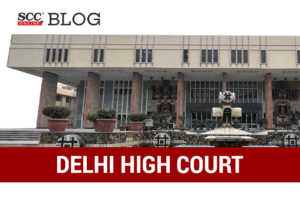Delhi High Court: In a suit filed by the plaintiff-son under Order 39 Rule 1 and 2 read with Section 151 Civil Procedure Code (CPC) seeking ex-parte ad-interim injunction praying to stay further proceedings of the case as initiated by parents of the plaintiff against the plaintiff under Section 23 of The Maintenance and Welfare of Parents and Senior Citizens Act, 2007 (Senior Citizens Act). The suit further seeks to declare that the suit property is a Hindu undivided family (HUF) property, and the plaintiff has the coparcenary rights in the same. Mini Pushkarna, J., held that the pendency of a partition suit by the son against his parents is no deterrent or hindrance to proceeding with the matter before the Maintenance Tribunal under the Senior Citizens Act and it can continue, thus, relevant orders can be passed by the competent authority under the said Act, irrespective of any litigation for partition of the property in question.
Defendants 1 and 2 are the father and mother of the plaintiff herein. The defendants had initiated proceedings under Section 23 of the Senior Citizens Act against their son by filing a complaint before the Maintenance Tribunal based on physical and mental abuse leveled by the plaintiff on his parents. Thus, defendants 1 and 2 have sought the removal of the plaintiff from the suit property, where the parties are jointly residing before the Maintenance Tribunal.
The issue to be decided in the present application is regards entitlement of the plaintiff to grant of interim protection for stay of the proceeding pending before the Maintenance Tribunal under Senior Citizens Act based on the premise that the suit property is HUF property and the plaintiff having coparcenary right in the same, is entitled to continue to live there, pending the present suit for partition of the said property.
The Court noted that the Senior Citizens Act was enacted in order to combat the social challenge of elderly parents not being looked after or provided for by their children. Section 3 of the Senior Citizens Act states that the provisions of this Act shall have an overriding effect over all other Acts inconsistent with this Act. Furthermore, Section 2(f) of the Senior Citizens Act describes the property as both Ancestral and Self Acquired.
The Court remarked that Senior Citizens have every right to protect themselves and in case of ill-treatment and abuse by their children/ legal heirs, can approach the Maintenance Tribunal for their eviction from their property of any kind, which includes both Ancestral as well as Self Acquired Property. Thus, the contention raised on behalf of the plaintiff that the suit property is HUF property, in which the plaintiff has interests as a coparcener, is totally irrelevant to the proceedings initiated under the Senior Citizens Act.
The Court concluded that the pendency of a partition suit by the son against his parents is no deterrent or hindrance to proceeding with the matter before the Maintenance Tribunal under the Senior Citizens Act. Thus, the Court held that the said proceedings could continue, and relevant orders can be passed by the competent authority under the said Act, irrespective of any litigation for partition of the property in question.
[Aditya Gupta v Narender Gupta, 2023 SCC OnLine Del 1127, decided on 24-02-2023]
Advocates who appeared in this case :
Mr. Rajesh Mahindru, Advocate for the Plaintiff;
Mr. Jai Sahai Endlaw with Mr. Ashutosh Rana, Advocates for the Defendants.

